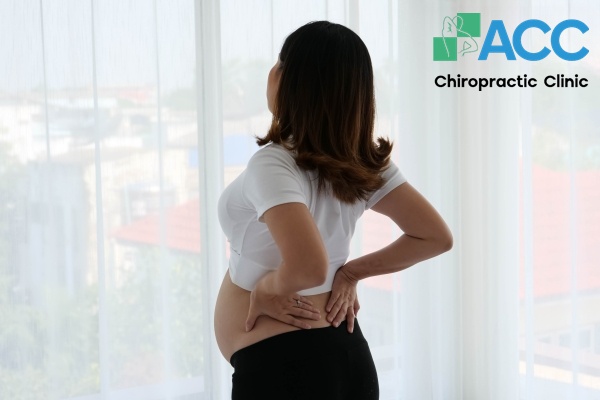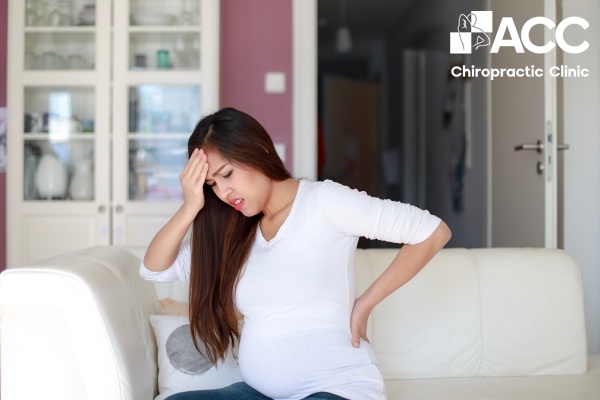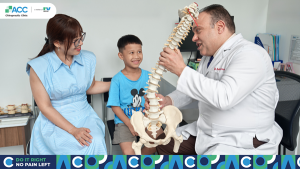Contents
Medical statistics show that around 50–80% of pregnant women experience back pain during pregnancy. The pain can begin as early as the first trimester and may persist even after childbirth. For some mothers, back pain is mild and short-lived, but in many cases, it can be persistent and extremely uncomfortable, significantly affecting daily activities and mental well-being.
1. Symptoms of Back Pain During Pregnancy
The severity of back pain can vary depending on each individual’s condition. However, the most common symptoms include:
- Onset of back pain in the first trimester, increasing in intensity in the third trimester
- Pain worsens at night
- Aching or soreness in the lumbar spine, particularly the lower back
- Pain in the joint connecting the sacrum and pelvis throughout pregnancy
- Back pain accompanied by morning sickness, acid reflux, or headaches
2. Causes of Back Pain During Pregnancy
There are numerous reasons why pregnant women may experience back pain, especially in the first trimester and throughout pregnancy. Most cases are caused by natural bodily changes such as weight gain and hormonal shifts. However, in some cases, back pain may also indicate underlying spinal conditions.
2.1. Increased Pressure on the Lumbar Spine and Loss of Natural Spinal Curvature
Sudden weight gain puts extra strain on the spine. As the baby grows, added pressure is placed on the blood vessels and nerves in the pelvis and back, resulting in discomfort.
Additionally, the shift in the body’s center of gravity causes the lumbar spine to curve forward. To maintain balance while walking, mothers often lean backward, which can damage the spine and lead to pain.

2.2. Weakened Abdominal Muscles Causing Pressure on the Back
Abdominal muscles play a key role in supporting the spine. However, as the baby grows, these muscles stretch and weaken, leading to compression of the back muscles and resulting in pain
2.3. Hormonal Changes During Pregnancy
As the pregnancy progresses, particularly in the final weeks, the body produces a hormone called Relaxin, which relaxes ligaments and the pelvic area to facilitate childbirth. Unfortunately, this also contributes to lower back pain and pelvic discomfort
2.4. Stress or Depression
Some women may not realize that emotional stress and hormonal mood swings can trigger or worsen back pain. Experts say that prolonged stress increases muscle tension throughout the body, especially in the back

2.5. Underlying Medical Conditions
Spinal conditions such as sciatica or herniated discs may also contribute to back pain during pregnancy. Sciatica is the most common, characterized by pain that begins in the lower back and radiates down the buttocks, thighs, and calves, often accompanied by numbness. This pain usually affects one side and worsens with prolonged sitting or walking, and may subside with rest.
3. Is Back Pain During Pregnancy a Concern?
Back pain during pregnancy is usually a normal physiological response to the body adapting to the growing baby. Pregnant women shouldn’t be overly concerned.
However, if the pain becomes severe, persistent, or radiates to the buttocks, legs, or calves, it is important to consult a doctor as it may be a sign of a spinal disorder. Ignoring the symptoms could lead to worsening pain, impaired mobility, poor sleep, physical exhaustion, and potential impact on fetal development.
4. Ways to Alleviate Back Pain During Pregnancy
Back pain during the first trimester or throughout pregnancy can be troublesome. Here are some helpful methods:
4.1. Home Remedies to Reduce Back Pain
- Gentle Exercise: Activities like walking, prenatal yoga, or swimming can improve muscle strength, flexibility, and reduce back pain. Additionally, to effectively relieve back pain during pregnancy, expectant mothers can perform some exercises to strengthen the back and abdominal muscles HERE.

- Hot or Cold Compress: Use cold compresses (ice packs wrapped in cloth) on the lower back for 20 minutes a few times daily. After two or three days, switch to warm compresses to relax the muscles.
- Wear Flat Shoes: Replace high heels with comfortable, supportive flat shoes to improve balance and reduce spinal pressure.
- Improve Posture: Avoid slouching or sudden bending. Maintain proper posture when standing, sitting, or lying down. For example, when sleeping, lie on your side with one or two pillows between your legs or under your belly.
- Use Supportive Chairs and Mattresses: Choose chairs with lumbar support or place a small pillow behind your lower back. A firm mattress also helps keep the spine aligned.
Other helpful tips:
- Avoid sitting or standing in the same position for too long.
- Do not lift heavy objects or bend over for extended periods.
- Wear loose clothing that doesn’t constrict the abdomen or back.
- Soak your feet in warm water for 15 minutes before bed to relax muscles.
- Establish a regular sleep schedule and avoid staying up late.
- Avoid stimulants like alcohol and caffeine that can disrupt sleep.
4.2. Chiropractic Care for Pregnant Women
Chiropractic treatment is a drug-free, non-surgical method considered safe for both mother and baby.
ACC Chiropractic Clinic is a pioneer in chiropractic care for musculoskeletal conditions in Vietnam. Over the past 15+ years, ACC has helped many patients relieve pain and regain normal activity.

At ACC, the team of doctors is 100% trained in countries like the US, France, and South Korea, and uses advanced facilities to design personalized treatment plans for each patient.
This method not only relieves pain but also helps balance the pelvic area, making it easier for the baby to move into the correct birthing position—potentially reducing labor time and the risk of difficult delivery.
4.3. Physical Therapy for Pregnant Women
In addition to chiropractic care, ACC combines physical therapy to further relieve pain, prevent recurrence, and promote recovery—ensuring a safer, more comfortable pregnancy.
Although back pain during pregnancy is common, it should never be ignored. Pregnant women are encouraged to monitor their symptoms carefully. If back pain becomes severe or persistent, consult a specialist for appropriate diagnosis and treatment to protect both mother and baby.






